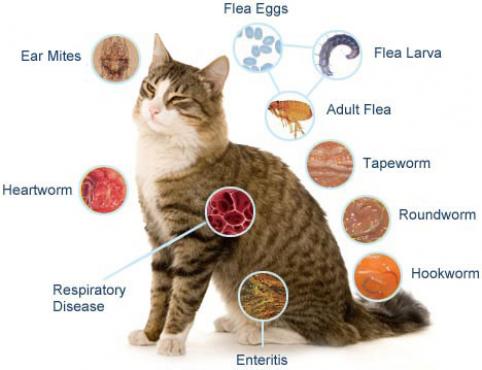
Learn how to get rid of worms in a cat at home safely with the right products
You are a first-time cat owner. In other words, you do not know diddly about felines and their care. One of the first tidbits of information you need to acquire is whether your feline is infested with worms, which are intestinal parasites. Felines are frequently afflicted with hookworms, roundworms, lung worms and tape worms.
Parasites are rountinely checked for by your pet’s veterinarian. Make sure that you adhere to a regular schedule of check ups and vaccinations for your cat. Fleas and mosquitoes can precipitate an infestation of internal parasites by transmitting them to your cat through bites or if your cat eats the bugs. If you pet is infested with internal parasites, your vet will recommend a number of worming medications that can solve the problem without jeopardizing your cat’s health.
How do you know if your pet has them?
Symptoms include seeing parasites in the feline’s stool or around his anus, diarrhea, abdominal bloating; constipation; difficulty breathing and vomiting. Sometimes you can see parasites in the feline’s vomit.
~
Tapeworms
When a feline has this type of parasite you will see what resembles cucumber seeds or grains of rice. The parasites – or segments of the parasite – may collect near the feline’s anus and will be visible in its stool.
Roundworms
This parasite looks similar to spaghetti and is several inches in length. Sometimes you can see them in the feline’s stool or vomit.
Lung and hookworms are not visible to the eye. The only way to determine if there is an infestation is to have the animal tested by a veterinarian, who will test the creature’s stool, looking for eggs.
How do they get them?
Parasites are acquired when the feline eat the feces of an infected cat. Additionally, if the feline ingests birds or rodents that have eaten snails or slugs this can pass on parasites. Kittens get them from their mother.
What happens then?
When a feline gets parasites, the initial problem occurs in the digestive tract because many parasites live in the intestines, with the exception of a stomach parasite that makes it home in the belly. The feline will get diarrhea, lose his appetite, vomit. The animal’s tummy may appear distended and the coat becomes ragged and lackluster. There may be mucus or blood in the feline’s vomit or stool.
Look at the color of the animal’s gums. If they are pale, and not pink, this may indicate an infiltration of parasites.
When a feline acquires hookworm, its stool becomes tarry and dark.
Treatment
Do not be negligent when it comes to treating your pet for parasites. Long-term effects incude anemia (iron poor blood) which occurs because there is blood loss. Kittens can die from parasites.
Roundworms in particular cause intestinal blockages, which can lead to death. The animal’s rectum prolapses (falls out and looks like a fleshy tube bulging out of the butt.) This can be fatal.
How to get rid of worms in a cat at home?
Methodical worming is necessary if you want your pet to stay healthy. There are various medicines a cat-owner can use including Popantel, Felex Plus and Valucat Paste Allwormer, all of which you can apply at home. However, keep in mind these medicines are essentially poison, meant to kill parasites and certainly not your pet. If you are not sure what is wrong with your feline, get the animal diagnosed properly by a vet. If the animal is suffering from another health condition, giving the feline this medicine could prove toxic and have serious ramifications.
Frequently changing the litter box helps lessen the chance your feline will get parasites. Wear gloves when changing the litter box so you don’t get them.
If you want to treat your feline at home (after specifically determining he has worms) you can find products at affordable prices that work well. These medications can be promptly shipped to your residence at no cost.
Pet owners know it costs a lot of money to keep their animals healthy. If you can keep your pet in good shape but also save money at the same time, why not?
